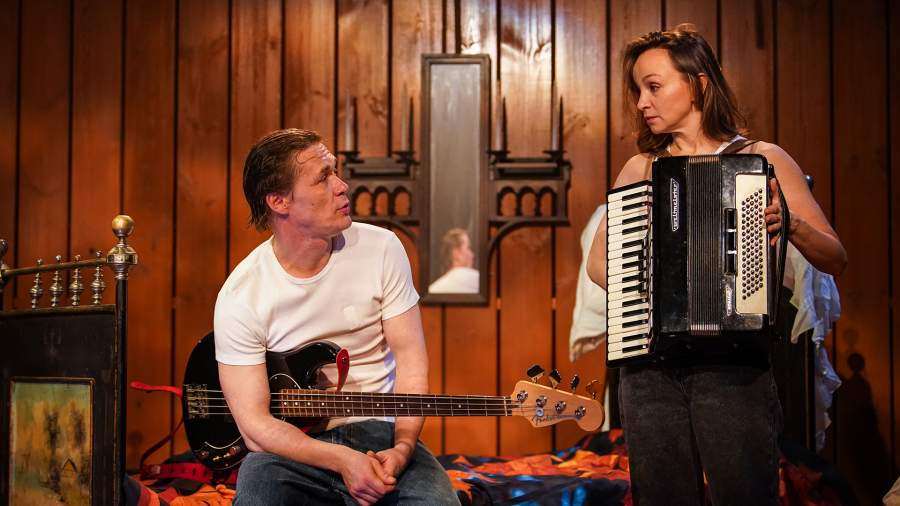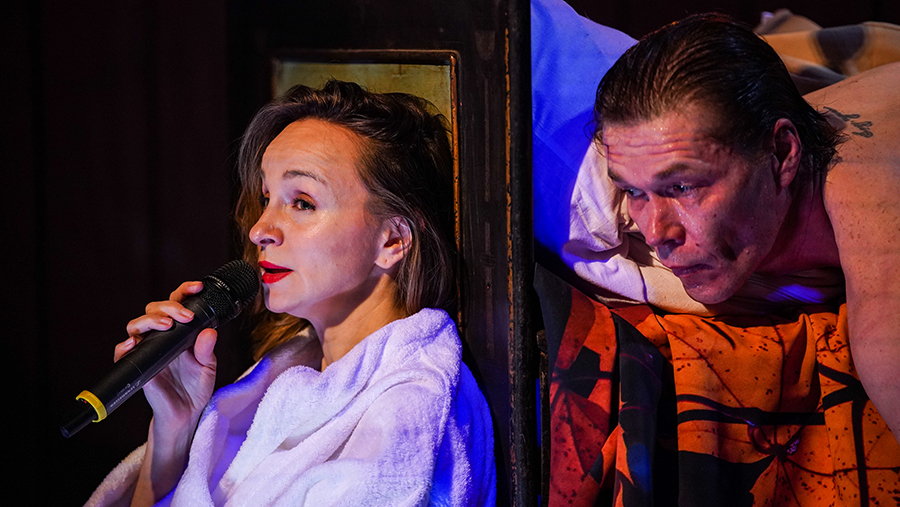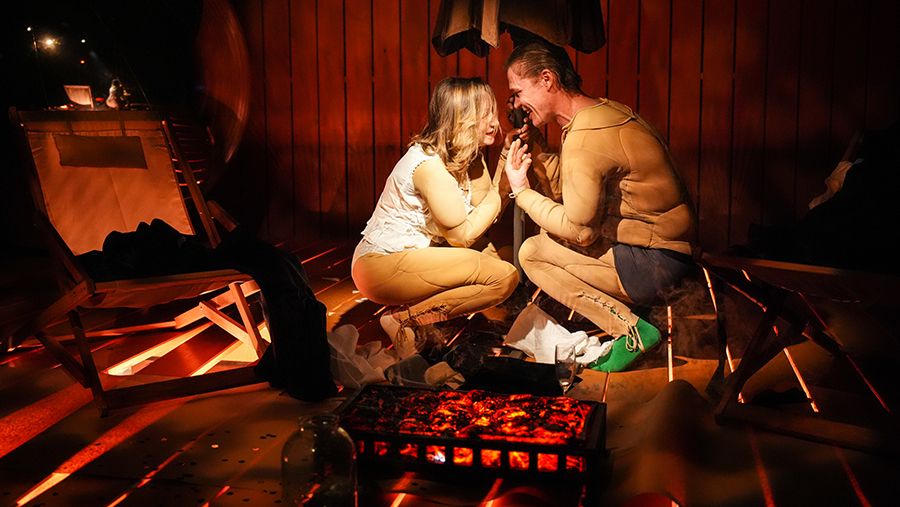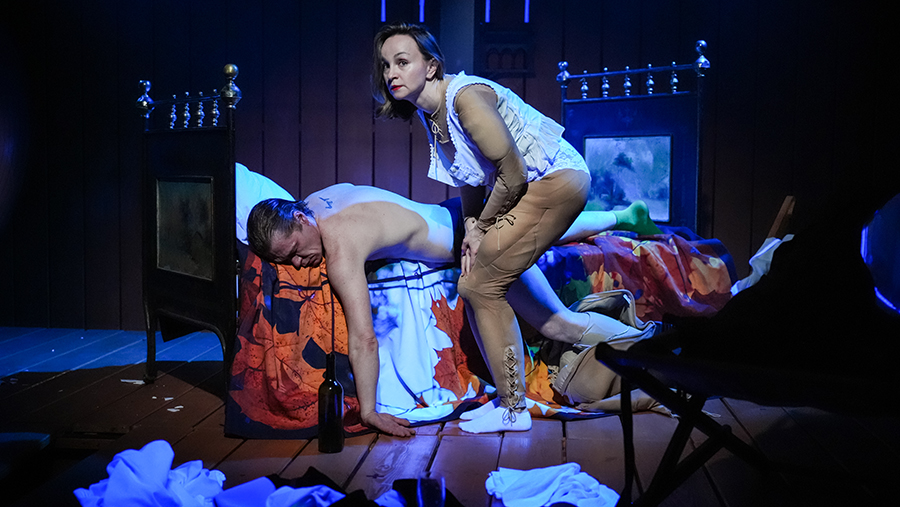Feelings and vulnerabilities: August Strindberg's "Autumn" was staged at the Moscow Art Theater
- Статьи
- Culture
- Feelings and vulnerabilities: August Strindberg's "Autumn" was staged at the Moscow Art Theater

The characters of Artyom Bystrov and Olga Litvinova tell us how to return the old feelings after ten years of marriage so that it does not hurt insanely for the years spent. Director Andrey Goncharov created the play "Autumn" about a man and a woman who have lost their attraction to each other and are saving their relationship in separation. Izvestia attended the premiere at the Moscow Art Theater and tried to understand the formulas of love.
What is the play "Autumn" about at the Moscow Art Theater
The creative tandem of Artyom Bystrov (the star of the film "The Fool") and Olga Litvinova has already fallen in love with theatergoers. Director Andrey Goncharova had previously staged the play "The Womb" with these artists, where he turned the terrible prose of Evgeny Zamyatin into a musical peasant thriller.
His courage and desire for experimentation attracted the audience this time. Everyone was intrigued by how Goncharov would interpret Strindberg, whether he would offer the artists to demonstrate their vocal skills and whether he would turn everything upside down. The prepared audience was waiting for anything, and for the neophytes, "Autumn" was perceived as a chance to get acquainted with Swedish drama and with the excellent actors of the Art Theater.

For director Andrey Goncharov, the vulnerability of the characters and empathy turned out to be most important in Strindberg's story. The director draws the viewer into this story, makes them empathize with the characters. It's not difficult to connect to them, and literally: the new stage of the Moscow Art Theater is designed so that you can literally reach the artists with your hand.
Axel and Lily are married. Strindberg writes: "They were married for ten years. Happy? Yes, as far as circumstances allowed. It was difficult for both of them, like two equally strong horses, each pulling its own strap." The thrill of first feelings and the heat of passion are worn out by everyday life, therefore they are long in the past. But the wonderful moments are still alive in the memory of the spouses. Both cannot figure out how to build a relationship further, how not to go into depression or reflection.
Everyone wants to make changes, but the man is the first to decide on them in this couple. Axel gets a job as a secretary at the prison inspectorate and has to go on a business trip. He decides to leave the house, and possibly forever, but his wife doesn't know about it yet. A woman does not dissuade, but, on the contrary, helps her partner to take a step away from herself. But it is she who keeps her finger on the pulse of her beloved, because after so many years he beats in the same rhythm.

Andrey Goncharov wonders how to believe in spring in this autumn, how to continue to love each other. The fear of the collapse of a relationship sets in for Strindberg's characters at a time when the children have not yet grown up and only ten years have passed. And, it seems, there is a chance to start life anew, but without this man, once beloved. The hero decides to write a letter to his wife. In it, he says that he was sent on a business trip to another city for work. Not wanting to decide on a divorce, he just runs away from problems.
Is it worth watching "Autumn"
The devastation in the soul was recreated by the production designer Konstantin Solovyov in the space surrounding the characters. Apart from the wooden walls and floor, there are only two chairs on the stage. With the decision to leave this place, the characters gradually begin to acquire possessions. They seem to hide behind them, compensating for the lack of love with the desire to create their own nest on their own. So, at some point, Olga Litvinova's heroine rolls a huge mirror ball onto the stage. It fills up a third of the entire space. The mirror is a metaphor: the characters see themselves in a distorted reflection. But to get the right angle, you need to stand up, get closer, and that's the only way to see the true "face" of the problem.

In parallel with "Autumn," Andrei Goncharov worked on the production of the musical "Transformation" at the Taganka Theater, based on Kafka's novel of the same name. Attentive viewers will notice in the Moscow Art Theater performance some greetings from the Czech writer to the Swedish playwright.
Costume designers also helped bring the history of the Swedes of the late 19th century closer to the audience. This happens gradually over the course of the action. Multi-layered costumes and make-up were created for slender artists. Thicknesses, not overhead, but in the form of overalls, added weight to the characters. There are more clothes on top. As a result, it feels like Olga and Artyom aren't playing in their own bodies.
The eccentrics were added by the actor's complex makeup. Artyom Bystrov appears in front of the audience with a decent bald spot, which is framed not only by memories of a magnificent head of hair, but also by the thick sideburns of a Swedish fisherman. The audience doesn't immediately realize that the actor didn't have to shave his head for the role. It was only when sweat trickled down Artyom's face that it became clear to everyone that the role was not easy. At some point, Bystrov removed the rubber pad and exhaled. And when the artists took off their thicknesses in the final, the audience breathed a sigh of relief. It seems that the actors obviously lose more than one kilogram for each performance.

The artists also had to learn how to play musical instruments. Olga Litvinova sings and accompanies herself on the accordion. And Artyom plays along with her on the bass guitar.
For the characters, the director turned back time, they became younger and more beautiful. They are literally not only losing weight, but also getting younger. This is the power of love. And now the actress is not wearing a velvet hood with lace, but jeans with a T-shirt. Axel and Lily's feelings returned. Now the heroes have enough time to catch up. Andrey Goncharov's play is about how we all lack sensuality and, oddly enough, vulnerability. Because that, in his opinion, is what human growth is all about.
Переведено сервисом «Яндекс Переводчик»


